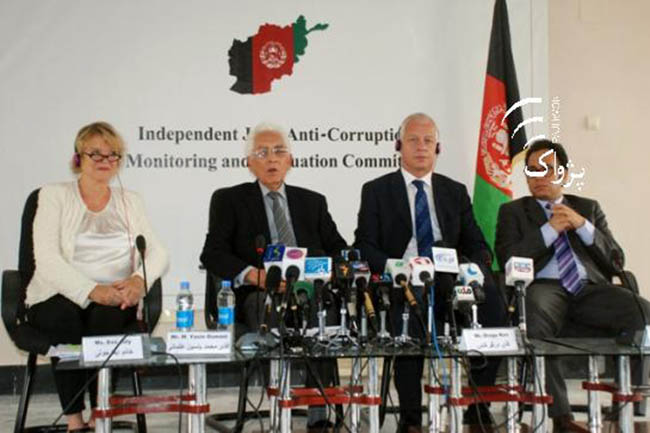KABUL - The Independent Joint Anti-corruption and Evaluating Committee (MEC) on Sunday released its ‘special report’ on vulnerabilities to corruption in imports and supply of fuel and liquid gas.
In a statement the MEC said the special report assessed challenges of the legal framework, management and practical operations of the importation of fuel and liquid gas into Afghanistan.
The report said the vulnerabilities had resulted in the loss of millions of dollars of vital revenue.
“These opportunities for corruption have facilitated smuggling, inappropriate pricing, lawlessness, and ultimately the rise of criminal patronage networks.”
The report cited the lack of supporting government policies for fuel importation and inconstant and contradicting resolutions issued by the Council of Ministers as “matters of deep concern.”
Millions of dollars invested by fuel refining companies remain stagnant and hundreds of workers of these companies were laid off, all a result of contradictory policies and resolutions, the report says.
“This has also led to applicable laws in the process of fuel and liquid gas importation is not being fully implemented.”
The statement said a large portion of fuel and liquid gas was smuggled into the country. Some of the border equipment – including scanners, weigh scales, quality control laboratories – have been sabotaged by paid government employees due to lack of management and application of policies.
“Because this equipment has been sabotaged and not repaired, this has led to smuggling, the taking of bribes and custom duty evasion.”
The report said the lack of leadership, lax management of the process, low capacity and the lack of proper equipment had greatly contributed to these problems.
For example, while the Afghan Fuel and Liquid Gas Enterprise (AFLGE) was created as a for-profit entity, but it ended in four billion afghanis in debt in 2015.
“Collected statistics show that in 2015 this entity was not able to provide the proper level of services and subsequently could not collect USD 17.96 million in service fees.”
The two main government entities charged with managing the importation of fuel and liquid gas (Custom’s Department and AFLGE) themselves disagree with how much fuel and liquid gas was actually imported.
The difference in 2015 alone was hundreds of thousands of tons, which MEC estimates “resulted in a loss of revenue in excess of USD 70 million.”
“This cannot continue and MEC urges the government to immediately create of a high-level team to investigate why such gross misconduct occurs, identify those suspected of corruption and refer them to the Attorney General Office for prosecution.”
The MEC also urged the government to develop a proper mechanism so that such abuses were stopped and it was ensured that in future full amount of customs revenues were collected.
Corruption, lack of well-designed systems, and the inability of ANSA to better control the quality of imported fuel has facilitated the importation of low-quality fuel and liquid gas.
In addition, the current custom duty exemption mechanism which was designed for importing fuel and liquid gas to the international forces, has instead led to abuse by fuel traders which then allows them to illegally profit.
“The international forces and the Ministry of Finance have agreed to change this, but that is not enough.”
The MEC called on the parties to immediately sign and implement the proposed memorandum of understanding changing the current process and ending the abuse.
“Considering all these vulnerabilities to corruption, as part of this Special Report, MEC proposes 36 recommendations to related government institutions for the improvement of the process of importing fuel and liquid gas.”
The recommendations included both substantial legal reform and the uniform application of the laws, establishment of effective leadership, monitoring the system of importation, better equipment at border customs houses, structural and human resource reforms, and better management of the exemption for fuel and liquid gas for international forces. (Pajhwok)
Home » Afghanistan » MEC Releases Report on Corruption Vulnerabilities in Fuel Imports
MEC Releases Report on Corruption Vulnerabilities in Fuel Imports

